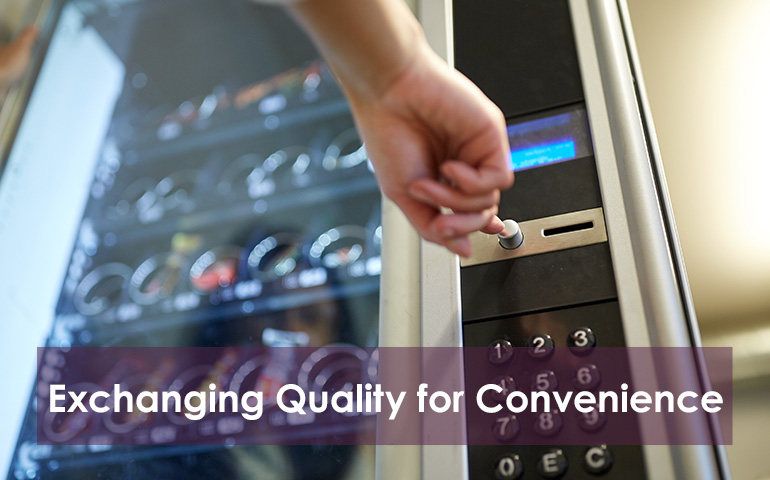
Exchanging Quality for Convenience
by Chris Petry About half an hour into quirky auteur Wes Anderson’s new comedy Asteroid City, there’s a throwaway gag with Steve Carell’s motel manager and a nomadic cowboy involving a row of oddly-specific vending machines. There are independent machines for milk, coffee, beer, fruit, stockings, ammunition, and the piece de resistance: upscale cocktails that would have my editor weighing her buy-in stock options. The vendor that stuck out most, however, was a real estate vending machine which gave purchasers access to barren desert acreage on retired atom bomb test sites. Mr. Anderson didn’t invent this idea, sadly. It was only a couple years back Zillow began dipping their toes into direct digital purchase options for land as well as commercial and residential real estate. Let’s discuss why that’s a bad idea, as convenient as it appears in writing. I know what you’re thinking: why pay a real estate professional to assist me in my real estate needs when there’s a one-stop-shop option that requires little more than the click of a button? First off, let’s dispel some of the common misconceptions about the client/agent relationship. You are not paying a REALTOR a dime out of your own pocket for their professional consultation or stewardship. Agents are paid an agreed upon percentage of the final sale price of the home after closing. That percentage is agreed upon between them and their broker. Real estate commissions are split between four representatives of a transaction. The agent representing the buyer, the agent representing the seller, and the affiliated broker of both agents. All this will happen on the backend so you never have to worry about any of it. Putting all the financial mumbo jumbo aside, the most important reason you should opt for the services of a real estate professional is because you’ll have an extra layer of protection from the contengencies, legal requirements, and ambiguities of a real estate transaction. Any REALTOR worth their salt will go over a comprehensive checklist with you to make sure all bases are covered. Are there health, repair, or safety disclosures that need recorded so potential buyers will be fully aware of what to expect? Do you simply want to ensure that you’re getting the best sell price possible for your investment? Or, if you’re a buyer, that you’re getting the best available deal for your money? A REALTOR will do all that negotiating on your behalf. Finally, there’s the cost to risk ratio to take into consideration. Say you spend 75 cents on a single serve bag of potato chips at a rest stop. You love Doritos and know it’s a safe bet to invest your money on them, but you’re admittingly intrigued by the sound of Biscuits and Gravy- flavored wavy Lays. You get to the car and tear open the bag like a grizzly bear at a campsite, salivating from the delectable scent wafting from the bag. You take a bite and... yuck! Luckily, you only spent 75 cents on the displeasure of your discovery. What if you spent $275,000? I don’t need to tell you there’s a little more risk involved in one impulse buy.
When you pay for a service without representation, you will only receive information required by the federal government or obtained from your own research. That’s great if you’re extra business savvy and/or willing to take unnecessary risks. Think about the Surgeon’s General Warning on a pack of cigarettes. The warning does the bare minimum. It warns you that government research indicates that smoking, particularly in excess, has been linked to cancer and birth defects. It doesn’t give you a full percentage by percentage breakdown of those stats, how the research was conducted, what controls were introduced to the test group, or whether you’re more at risk if you smoke in conjunction with doing A, B, or C. Consumer protection works about the same in all aspects of the economy. Let a trained real estate professional do the reading for you and advise you of any risks, rewards, concerns, or requirements involved in a given real estate transaction.
So, if the allure of a vending machine promising the deed to Buckingham Palace seems too good to be true, well, it is.





